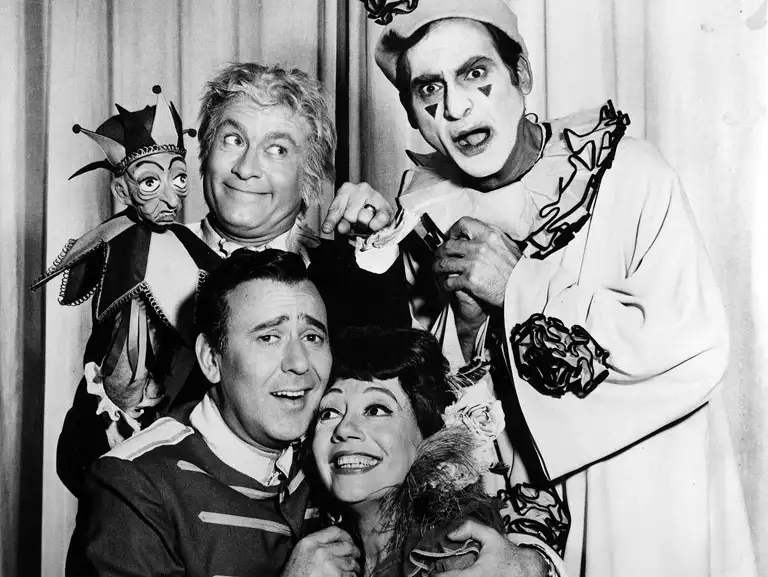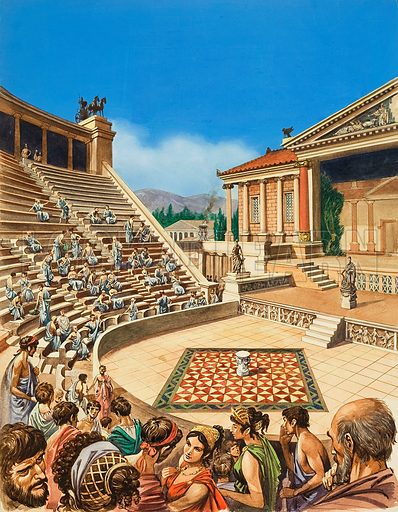
Delve into the diverse and dynamic world of comedy shows, a genre that’s kept audiences around the world laughing for decades. From early slapstick and satire to sophisticated sitcoms and stand-up specials, comedy shows have a rich history and an even brighter future. Comedy, in its many forms, has been a part of human culture since ancient times.
The Greeks and Romans, for instance, incorporated comedy into their theatrical performances. However, it wasn’t until the advent of television that comedy shows, as we know them today, came into existence.

The Comedy Television Era: 1950s to 1970s
The 1950s ushered in a new age for comedy shows. As television sets became a staple in American households, comedy shows started to gain immense popularity. I Love Lucy, considered one of the greatest sitcoms of all time, was a pioneer of this era. With its zany charm and unforgettable characters, it set the standard for the sitcoms that followed. Other noteworthy shows like The Honeymooners and The Andy Griffith Show also found a place in the hearts of viewers during this period.
As we moved into the 1960s, comedy shows became more daring and started to reflect societal changes. Shows like The Dick Van Dyke Show and The Beverly Hillbillies were not only funny but also pushed boundaries. These shows expertly balanced hilarity with insightful commentary, making them more than just a source of laughs.
The 1970s saw comedy shows delve even deeper into societal issues while maintaining their comedic edge. Shows like All in the Family and M*A*S*H tackled serious topics such as politics, war, and racism, but did so in a way that was accessible and entertaining. This winning formula ensured their spot in the pantheon of great comedy shows.
It’s not hyperbole to say that the comedy shows of this era laid the groundwork for modern comedy. They pushed the envelope, broke the mold, and, most importantly, they made us laugh. From slapstick to satire, from punchlines to poignant moments, these shows have left an indelible mark on television history.
So, sit back and strap in as we continue this hilarious historical journey through the decades of comedy shows, a genre that’s as diverse and dynamic as the laughter it elicits.
Comedy in the Modern Age: 1980s to 2000s
The 1980s marked a new era for comedy television, with a shift towards more diverse and inclusionary narratives. Sitcoms became a popular genre, with shows like “Cheers”, “The Cosby Show”, and “Seinfeld” dominating the airwaves. This era also saw the rise of animated comedy with “The Simpsons” breaking ground in 1989. These shows not only provided laughter but also explored societal issues, making comedy a powerful medium for social commentary.
By the 2000s, the comedy show landscape had significantly evolved. With the advent of reality TV, comedy shows such as “The Office” and “Parks and Recreation” used a “mockumentary” style to satirize the genre. Stand-up comedy also gained popularity, with comedians like Dave Chappelle and Chris Rock having their own successful shows. The rise of cable networks also allowed for more experimental and edgy comedy shows like “South Park” and “Curb Your Enthusiasm”.
The Digital Revolution: Comedy in the Internet Age
The advent of the Internet brought about a significant change in the comedy show landscape. With the emergence of streaming platforms like Netflix, Amazon Prime, and Hulu, comedy shows gained a new avenue for distribution. This allowed for greater creative freedom, giving birth to unique and innovative comedy shows like “BoJack Horseman”, “Brooklyn Nine-Nine”, and “The Good Place”.
Moreover, the Internet also allowed for the rise of web series, short-form comedy sketches, and stand-up specials. Platforms like YouTube provided a platform for independent creators to create and share their own comedy content, breaking barriers and democratizing comedy in a new way. For instance, “Comedians in Cars Getting Coffee” started as a web series before being picked up by Netflix.
The digital era has also seen the rise of comedy podcasts, providing a new form of comedic entertainment. Shows such as “Comedy Bang! Bang!” and “My Dad Wrote A Porno” have garnered massive followings, proving that comedy can thrive in an audio format.
The Origins of Comedy Shows
The origins of comedy shows can be traced back to the early days of the film industry. However, it wasn’t until the advent of radio and television that comedy shows found their true home. It was in the 1930s, with the rise of radio broadcasts, where comedy shows started to gain popularity. Shows like “Amos ‘n’ Andy” and “The Jack Benny Program” began to captivate audiences with humor.
The Comedy Television Era in 50s & 70s
With the introduction of television, comedy shows underwent a significant evolution. The 1950s to the 1970s can be considered as the “Golden Age” of comedy shows. Iconic shows such as “I Love Lucy”, “The Honeymooners”, and “The Andy Griffith Show” were born during this period. These shows not only entertained audiences but also touched on social issues subtly through humor.
1960s: A Time of Transition
The 1960s marked a transition in comedy shows, with the emergence of more sophisticated and socially relevant comedies. Shows like “The Dick Van Dyke Show” and “The Mary Tyler Moore Show” highlighted societal transitions and changing social norms.
Modern Age of Comedy in 1980s – 2000s
The comedy era from the 1980s to the 2000s is known for its diversity in humor and the emergence of several comedy genres. Sitcoms such as “Friends”, “Seinfeld”, and “The Simpsons” dominated the scene. Meanwhile, the late-night comedy show format, exemplified by “Saturday Night Live”, also gained popularity.
The Rise of Stand-Up Comedy
In the 1980s and 1990s, stand-up comedy emerged as a popular format. Comedians like Jerry Seinfeld, Eddie Murphy, and Ellen DeGeneres started their careers in stand-up before transitioning to television.
Internet Age in Comedy’s History
The advent of the internet and streaming platforms in the 2000s and 2010s has revolutionized comedy. Now, comedy content is not restricted to television or films. With platforms like YouTube and Netflix, comedians can reach a global audience. Shows such as “Brooklyn Nine-Nine” and “Parks and Recreation” have found success both on television and online.
The Power of Social Media
Social media platforms like TikTok and Instagram have given rise to a new generation of comedians. With the power to create and share content instantly, these platforms have become a vital tool for comedians to connect with their audience.
FAQ
How did comedy shows originate?
Comedy shows have their roots in radio and stage performances. With the advent of television in the 20th century, comedies became popular programming. They provided a way for families to gather and laugh together, offering much needed relief from everyday stresses.
What characterized the comedy television era from 1950s to 1970s?
During this period, comedy shows revolved around family dynamics and societal issues. They employed slapstick humor and exaggerated characters. Iconic shows like “I Love Lucy” and “The Cosby Show” are examples of this era.
How did comedy evolve from the 1980s to 2000s?
Comedy became more diverse and complex during this period. Shows started addressing a wider range of topics, from politics to social issues, using satire and wit. “Seinfeld,” “Friends,” and “The Simpsons” exemplify this evolution.
How has the digital revolution impacted comedy shows?
The digital age has massively broadened the comedy landscape. With platforms like YouTube, Netflix, and Hulu, comedians have more freedom to create diverse and niche content. Shows can now reach a global audience instantly.
What might the future hold for comedy shows?
The future of comedy shows is exciting, with the continuing growth of digital platforms enabling more innovation and diversity. We could see more interactive formats, personalized content, and even AI-generated comedy.
How has the evolution of comedy shows impacted society?
Comedy shows have always been a reflection of society. They’ve helped shape public opinion on social issues, given voice to marginalized groups, and provided a channel for political commentary. Over time, they’ve become a vital part of cultural discourse.
Leave a Reply